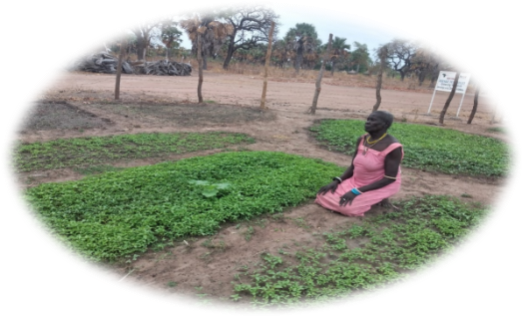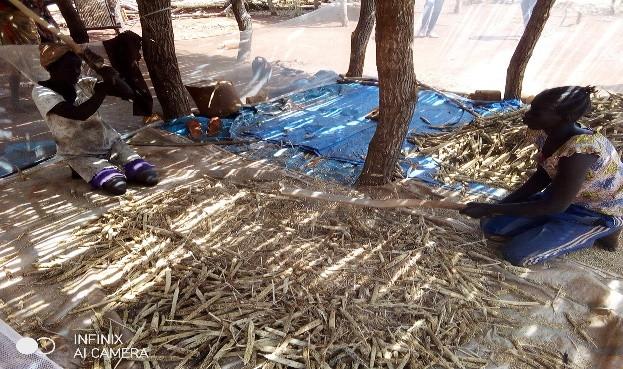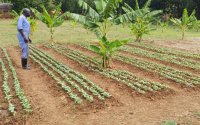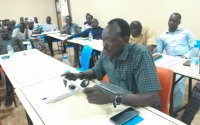Restoration and improvement of livelihood for peaceful co-existence in Lakes State.
The Peace Economy Project-Phase-III
ACROSS and Bread for the World (BfTW) have collaborated on livelihood programs in Rumbek Center and Wulu Counties since 2006. These initiatives have included building water yards, planting crops to produce food, and supplying ox plows. ACROSS has also promoted the establishment of Village Savings Loan Associations (VSLAs) – self-capitalized, self-managed savings organizations that lend money to one another using member funds. The residents of Rumbek and Wulu are experiencing better lives thanks to the support.
Mr. Malith David Maluk, who oversees the project’s present phase, provided first-hand observations on the effects the initiative has had in Lake State. Mr. Malith states that ACROSS has helped close to 2000 households escape poverty by providing individualized programs for women’s economic development, food security, and peacebuilding.
The community now has better access to fresh vegetable vegetation for consumption and marketing as well as safe drinking water thanks to the water yards. Many households are now cultivating five to seven feddans instead of only one, thanks to the advancements in ox-plow technology. The rising number of vegetable and crop seed kits has increased household seed diversity and resilience to shocks and stresses associated with climate change. Furthermore, the Village Saving and Loan Association (VSLA) has made it easier for women to access savings and loans in isolated areas without access to banking or microfinance institutions. This has enabled women to start businesses that were previously only operated by men.
Key achievements
- Two Water yards one at Kuelkuac and another at Abinajok have been successfully built.
- Eight vegetable production sites established.
- Abinajok multipurpose nursery and vegetable production sites established.
- Ten women’s VSLA groups were formed and trained.
- 50 households in Rumbek Center County received 50 ox plows and associated replacement parts.
Success Stories
My breakthrough has been in growing vegetables.
Mary Alruai lieny, a 56-year-old widow, resides in Rumbek Center County’s Matangai Payam. There, ACROSS assists a women’s group with 20 members in producing and retailing vegetables to increase household incomes and nutritional intakes. With only one child, Mary lost her husband to the Sudanese civil war in 2001. She was inherited later by her husband’s younger brother, and they currently have six children together. Mary emphasized how demanding and restless single life can be. She stated that it is hard for a widow to obtain food for a living, let alone clothing and other necessities, if she does not make up her mind. Mary argued that because she was unable to receive the support, she needs from the man who inherited her following her husband’s death, the circumstances compelled her to take on the roles of both mother and spouse for her children. She could provide for her children by doing what a man does.

Mary described how, in December 2020, ACROSS initiated a project to support 20 women in the neighborhood, and she began producing vegetable crops as a way to escape years of stress in her life. She remarked that she was fortunate enough to be recognized and chosen as a recipient.
Mary noted that the knowledge and expertise she received from the ACROSS FSL team’s numerous training sessions significantly changed her life. She described how, after completing her first and second trainings, she began choosing crops that she believed would provide her with the incomes she would need to better her situation. According to her, in that order of preference, the vegetable crops she loves to raise are okra, spider plant, amaranthus, jute-mallow, and kale, also known as sukuma in the area. According to her, her choice is determined by the needs of the market, the profits that each crop produces, and how frequently new seeds are sown. In this case, fewer farmers are producing kale, despite a comparatively larger market demand for it than for other vegetable crops. Comparably, compared to Jute-mallow and amaranthus, which are harvested just once, Kale requires less frequent seeding because, once planted and transplanted, the farmer may only need to collect the marketable foliage over a length of time exceeding three months.
According to Mary, the season and the type of vegetable crop are factors that affect sales revenue. According to her story, kale generates more money during the dry season than amaranthus, spider plant, and jute marshmallow. Okra, she said, ranks second in terms of income, despite taking a lengthy time to attain physiological maturity.
Mary emphasized how the last two years of cultivating vegetable crops have altered her life. She claimed that having four vegetable crop plots helped her guarantee a consistent supply of veggies for the market. According to Mary, she receives at least SSP 2000–3500, or $5.0, every plot, depending on the weight of the foliage. According to her, the main issues her farming operation is currently dealing with include a lack of better-quality seeds, the high cost of buying seeds, pests and diseases, a lack of irrigation equipment, and a shortage of farming implements.
Mary described how, despite all the difficulties she faces, she has significantly improved both her own and her family’s lives. She stated that she presently pays her three children’s school fees, as well as their medical expenses and the cost of food, clothing, and shoes.
Mary expressed her gratitude to ACROSS and Bread for the World (BftW), saying that she and her kids would not be able to survive without their help. According to Mary, the Peace Economy Project has given her renewed bravery, strength, and faith that things will turn out better in the future if donors would just provide them more support with livelihoods and food security.
An ox-plough donation increased my farming yields, and my home became harmonious.
Elizabeth Nyibol, on the right, is a 29-year-old farmer from Rumbek Center County’s Abinajok Boma. In 2023, she was given an ox-plough to increase the productivity of her farms. She only had two farming seasons left until end of 2023. But in January 2024, when the project crew paid her a visit at her farm in the Mikemble area, she was seen threshing her panicles made of sorghum and pearl millet.

In her account, Mrs. Nyibol stated that she had plowed at least five (5) feddans, which was significantly more than the project’s three (3) feddan goal. According to her, groundnuts were given at least two feddans, and sorghum and millet were interplanted in three feddans. She said that she had harvested fourteen (14) bags of groundnuts, nine (9) bags of pearl millet, and at least nine (9) bags of sorghum. Still, this is a big yield for just one beneficiary. She reported that grain dealers from Awiel had purchased her sorghum. She expressed her gratitude for the payment of her children’s expenses, particularly the registration fees, school fees, shoes, clothes, and medical costs. She stated that in order to enhance her net profits from produce grown on the farm, she needs to move a little bit higher the following season to cultivate at least seven (7) feddans.
According to Mrs. Nyibol, her husband, cousins, and other family members now respect her. “Who would respect you when you are poor and idle?” she asked. In my opinion, no one. She was referring to her husband, who used to argue with her at night over not having enough food in the house. She claimed that every time she asked her husband for food, they would argue and occasionally get physically violent.
She claimed that as a result of her increased contributions to the wellbeing of the family, her husband now respects her. She promised that she would be freed from arguments and needless beatings in due course.
Mrs. Aluel expressed her gratitude to ACROSS, Bread for the World, and BROT Network of Hope (NOH0) for enhancing her farming productivity. She compared their efforts to a drop of salt in a drum of water. According to her, in order to minimize the living conditions of suffering women, additional farming tools should be distributed to them.



